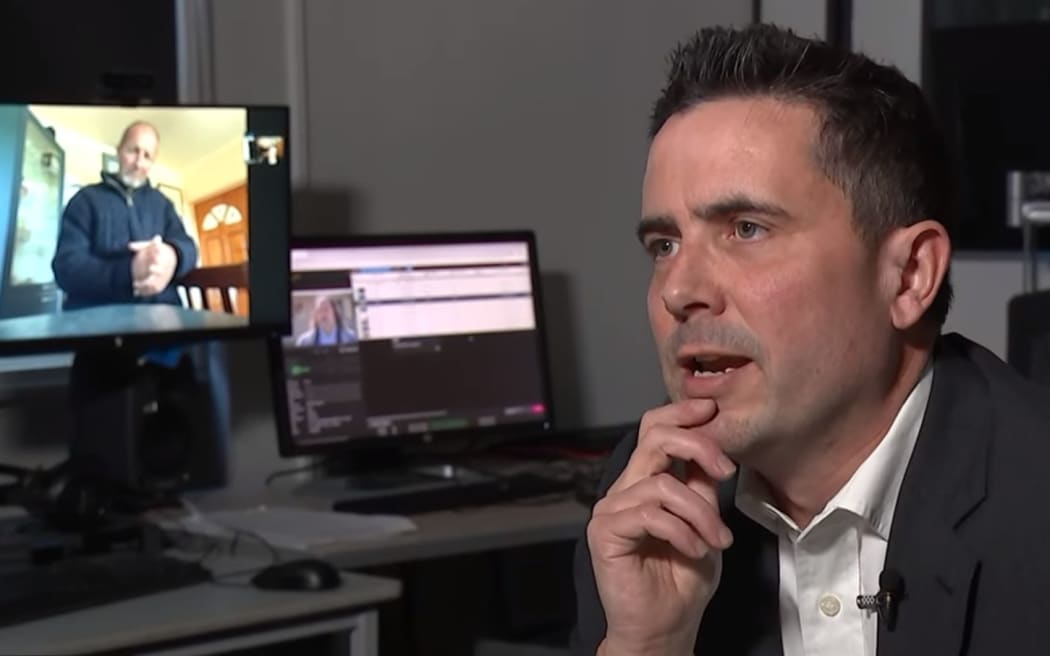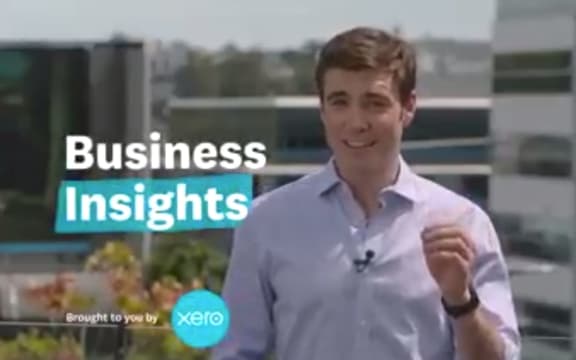Scrutiny of political parties' policies intensified this week - and so did the scrutiny of some candidates for seats in Parliament. When TVNZ reported some election candidates' controversial past statements this week, critics hit back with claims its own news was compromised.

TVNZ's Benedict Collins quizzes ACT MP Mark Cameron online about historic social media posts highlighting fringe views he says he longer believes. Photo:
TVNZ recently revealed one ACT candidate had resigned after social media posts comparing Covid restrictions to Nazi concentration camps came to light.
Another another ACT candidate apologised for comments made during the occupation of Parliament calling the former prime minister 'Jabcinda' and suggesting drowning victims had died from the Covid vaccine.
"I was just asking questions. It wasn't actually my genuine belief," he told 1News.
Last Tuesday 1 News reported a senior ACT MP already in Parliament also had some 'out there' views that were out there on social media before he entered Parliament
MP Mark Cameron had said "climate change is a hoax or that people who think the planet is warming are nut jobs".
The Spinoff's Toby Manhire found plenty more where that came from in MP Mark Cameron's Twitter account.
But when Benedict Collins pressed David Seymour about that last Monday, the ACT leader accused him of "B-grade journalism".
In reply, Collins pointed out Cameron could be a Cabinet minister after the upcoming election.
But Seymour did have one media voice in his corner for his criticism of TVNZ's news judgment.
"Trying to drag that up... is really just B-grade journalism," Mike Hosking told his Newstalk ZB listeners last Tuesday morning.
But it wasn't TVNZ's inquiries into the ACT MP which wound him up as much as a story in the media last week - the publicly funded Energy Efficiency and Conservation Authority buying airtime on TVNZ news shows last year.
"Their defence was that in the corner of the screen allegedly was some sort of recognition that the EECA was involved. Now that - in my 42 years in this industry - does not even come close to covering your badly exposed arse," he said.
Hosking reckoned TVNZ's news story about Act MP Cameron was connected.
"This is the same company at the moment - the state-run broadcaster - who was accepting money from the government to produce programs on climate change, place stories on the website on climate change, and do interviews on Breakfast and Seven Sharp on climate change... because they got money given to them by a government department," he said.
"[The Mark Cameron story] was the second story on their news. All of a sudden we're talking about climate change and whether people are deniers or not," he said.
Hosking insisted he was not a climate denier himself, but he said in a democracy climate deniers also had the right to be heard.
"Why does the state-funded newsroom have an agenda like that in an election campaign and why aren't they being called out on it?" he asked on his ZB show.
TVNZ isn't state-run. It is a state-owned Crown company whose independence from political influence and direction in editorial matters is enshrined in the law. EECA is not a "government department" but a Crown entity established under the the Energy Efficiency and Conservation Act in 2000.
It is monitored by the Ministry of Business, Innovation and Employment but neither the ministry nor the government control the spending of its budget for "encouraging, promoting and supporting energy efficiency and conservation."
TVNZ's newsroom isn't "state-funded" either. Advertising revenue funds TVNZ's news - and that is why TVNZ does deals with clients who want to get messages across on some TVNZ news programmes.
Hosking surely knows this, because when he was giving his opinions about this on the previous day - under the headline 'It wouldn't have happened in my day' - he pointed out that he had hosted both Breakfast and Seven Sharp in the past.
"When I was at TVNZ the thought would have horrified us. I can hand-on-heart say I would not have touched it with a bargepole," he told ZB listeners.
Back in 2012 Hosking himself was at the centre of reports about conflicts of interest. The Herald on Sunday said Mike Hosking was one of several people in the media, sports and showbiz acting as ambassadors for SkyCity.
SkyCity was in the news a lot at the time because it was hammering out a highly controversial deal with the government to get a bigger slice of the gambling market in exchange for building Auckland's new convention centre.
Hosking had written an earlier editorial in support of that deal in which he declared an interest with SkyCity.
"If I was taking a series of freebies and then there was a big issue around that company, how do people they have an acceptance or an understanding of how I might report that issue if they don't know? The transparency is the thing that we're trying to get to the bottom of here," the Herald on Sunday's editor Bryce Johns told Mediawatch at that time.
Hosking also said many of the Herald's claims about him were "embellished or simply untrue" but he said "life was too short to take the time or trouble" to refute them.
But Hosking insisted the risk of any conflict of interest was "merely theoretical".
"I wrote an editorial supporting it which by the way, I still do. I mentioned at the time I had a small interest with SkyCity and no one responded. No one mentioned it because then, like now, no one cares,' he said on air after the Herald on Sunday report.
But TVNZ did care. It told the Herald declaring commercial deals was one of the terms of Hosking's contract and it decided he should no longer present stories about SkyCity for TVNZ.
Sponsored content in TVNZ's shows
An individual broadcaster creating a potential or perceived conflict of interest for an employer because of a relationship with a company is not the same a publicly-funded body like EECA paying publicly owned TVNZ for airtime in news shows.
Last week TVNZ responded to concerns about that - and TVNZ current affairs hosts like Miriama Kamo (who hosted a one-hour TVNZ climate change prime time special paid for be EECA) and Jack Tame to front sponsored content.
"We are always looking at how we can further strengthen transparency around paid-partnering," said a spokesperson.
What does mean for TVNZ audiences? Is sponsored content in news shows being reconsidered?
"TVNZ is a commercially-funded organisation so the support of the advertisers is what enables to us to bring news and entertainment content to all New Zealanders for free. Talent involvement in paid-partnerships is considered for appropriateness so we always look at it through that lens," TVNZ's commercial director Jodi O'Donnell told Mediawatch this week.
"I think we do a pretty good job of it but we're certainly up for always thinking about how we could do better and how we could evolve it," she said.
"If we use the example of the 1 Climate Special, climate change is certainly a polarising for some people and I can understand why that there was additional interest in that. But Miriama Kamo is a sustainability warrior so that was a natural fit for that special show," she said.
Q+A presenter Jack Tame fronted news-like slots targeting small businesses which billed as Xero Buiness Insights.
This paid-for content was also hosted the TVNZ's 1 News social media feed alongside the journalism from those shows.

Xero Business Insights Photo:
Is the use of well-known current affairs journalist under consideration for paid-partnerships, including those with public agencies such as EECA?
"It is always about appropriateness and fit so what's important to remember is that TVNZ always retains editorial control of that in all of these partnerships... whether something is a good fit or whether it's appropriate or not," O'Donnell told Mediawatch.
"We have a lens across all categories of advertisers so... there would be no favour or otherwise against any advertiser," she told Mediawatch.

